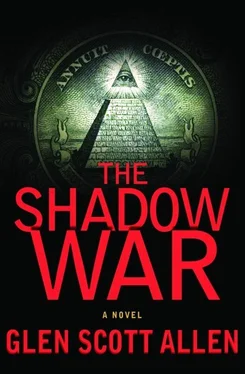Glen Allen - The shadow war
Здесь есть возможность читать онлайн «Glen Allen - The shadow war» весь текст электронной книги совершенно бесплатно (целиком полную версию без сокращений). В некоторых случаях можно слушать аудио, скачать через торрент в формате fb2 и присутствует краткое содержание. Жанр: Триллер, на английском языке. Описание произведения, (предисловие) а так же отзывы посетителей доступны на портале библиотеки ЛибКат.
- Название:The shadow war
- Автор:
- Жанр:
- Год:неизвестен
- ISBN:нет данных
- Рейтинг книги:5 / 5. Голосов: 1
-
Избранное:Добавить в избранное
- Отзывы:
-
Ваша оценка:
- 100
- 1
- 2
- 3
- 4
- 5
The shadow war: краткое содержание, описание и аннотация
Предлагаем к чтению аннотацию, описание, краткое содержание или предисловие (зависит от того, что написал сам автор книги «The shadow war»). Если вы не нашли необходимую информацию о книге — напишите в комментариях, мы постараемся отыскать её.
The shadow war — читать онлайн бесплатно полную книгу (весь текст) целиком
Ниже представлен текст книги, разбитый по страницам. Система сохранения места последней прочитанной страницы, позволяет с удобством читать онлайн бесплатно книгу «The shadow war», без необходимости каждый раз заново искать на чём Вы остановились. Поставьте закладку, и сможете в любой момент перейти на страницу, на которой закончили чтение.
Интервал:
Закладка:
Benjamin looked at Natalya slightly askance.
"But surely you don't believe the icon had anything to do with that."
Natalya shrugged. "Perhaps. Perhaps not. But you see? Superstition, religion-they are practically the same thing for most Russians. Which is why peasants will risk their lives for a painted statue."
By now they'd reached the Church of Our Praised Lady. There was a small graveled lot that held several buses and cars. Facing them was a white wall with an arch topped with a gold dome and the double-barred Russian Orthodox cross, and beneath the arch a gate, through which they walked to enter the grounds of the church. To every side there were thick groves of maple and birch trees and rows of lilac bushes. Even with the approach of winter, the land all about the church on the banks of the Volga was richly green.
The church was larger than Benjamin had expected, but not what he thought of as a cathedral. The architecture was instead Greek in style with two silver domes that were capped by black onion turrets and rose to points that supported large gold crosses. The church was painted white and a pale yellow color that by now Benjamin was identifying with almost all styles and periods of Russian architecture.
Climbing the few, broad steps to a small, semicircular entranceway, they entered the double wooden doors of the church.
Inside, Benjamin was again surprised: the restoration had been careful and thorough. The large, open space without pews, the arched ceiling high overhead, the stark white walls, the highly polished brown-and-green stone floor… all created the effect of a bright space full of energy. Around the edges of the church were carefully lined-up chairs, for the older visitors, of which there were many, and here and there about the floor were waist-high brass incense burners.
Before them was the altar space, with its screen of painted murals, brilliant colors depicting Christ to the right and Mary and Child to the left, with various saints flanking them. On the walls and pillars were dozens of icons: some painted in simple styles on plain wood, others made of ceramic tiles, some in cloth, with the older relics preserved in framed glass.
Natalya began discreetly looking around, obviously expecting to see her father somewhere, but also trying to appear the typical tourist, admiring the brightness and beauty of the church.
About the time Benjamin was beginning to get worried, they were approached by a young man in a priest's cassock. He came up to Natalya and spoke to her in Russian. She answered, and then the priest led her toward one of the doors near the altar space. Natalya motioned for Benjamin to follow.
Through the door, they then descended down a narrow, winding set of steps, to the church's basement. It was a large, open space, though with a series of half-walls extending from one end to the other and with an aisle down the center. Benjamin saw there were bricks beneath his feet, worn with time, and there was a musty, damp smell of a space long closed.
The half-walls created several enclosures to the left and right, almost like stables; in some of these furniture was stacked, in others icons and other art for which there was apparently not room upstairs. In one such space toward the rear they could make out, through the dim light, the legs of someone sitting on a chair.
The priest indicated they should go to that stall, then, taking Natalya's hand in his for a moment, he turned and left them.
Natalya walked to the end of the basement, Benjamin following her. When they reached the last stall on the right, they discovered a man sitting there, looking somewhat uncomfortable on a chair that must have been at least a hundred years old.
He immediately rose and came toward Natalya, saying "Natalya Nikolayevna!" They embraced warmly. Then he stepped back, surveyed her brunette hair, looked surprised.
After they'd spoken a few more words in Russian, he turned to Benjamin and extended his hand.
"Nikolai Orlov," he said in only slightly accented English. "I am pleased to greet you."
Nikolai was slightly taller than Benjamin, slightly thinner. Benjamin guessed he was in his late sixties. He had a long, narrow face, with extraordinarily bright blue eyes-he could see where Natalya had got the blue in her blue-green eyes-and close-cropped gray hair. His handshake was firm, and he placed his other hand on Benjamin's as they shook. Benjamin felt instant respect and trust for the man.
"Benjamin Wainwright," he said, and then added, almost instinctively, "sir. And I am pleased to meet you, as well."
Nikolai turned to Natalya again and spoke to her again in Russian. Then he motioned them to extract chairs from the stacks against the wall and sit down next to him.
Once they were seated, Natalya close to Nikolai and holding his hand, she looked at Benjamin.
"The first thing my father wants to know," she said, smiling, "is what the hell you are doing here."
Benjamin looked surprised, started to say something.
"Is joke," Nikolai said, patting Benjamin on the shoulder. "Sort of. I ask Natashka what brings you together. For your story, I mean. How do you come here in all this… khren, this mess?"
"Well," Benjamin said. "That's quite a story."
And then, as he had with Natalya, he started at the beginning, with the call from Fletcher to the Library of Congress, his arrival and meeting with Samuel Wolfe, and their subsequent investigation into Fletcher's death. But this time he tried to leave no detail unmentioned, thinking it was important that Nikolai understood the implications of passwords and poisons and sudden, inexplicable deaths. He wanted to make certain Nikolai grasped the full sinister background of everything that had happened to him, to know exactly what his daughter had become involved with.
With Natalya translating from time to time, Benjamin tried to include everything that had happened to him: Fletcher's death, Edith's "accident" with her bees, Wolfe's veiled warnings, his suspicions of a wider conspiracy (though even now he stopped short of including what he thought he'd seen in the Foundation mural)-everything to impress on Nikolai the danger his daughter faced.
Yet oddly enough, it wasn't until Benjamin came to the part about his discussions with Anton Sikorsky that Nikolai showed signs of anxiety, and finally anger, until he and Natalya were engaged in what sounded like a fierce argument, not a word of which Benjamin understood.
"I'm afraid," Natalya said with exasperation, "my father does not trust Anton's role in all this. Especially as he once worked for the Soviet Ministry of Defense. How do you know you can trust him, he wonders, especially after he disappeared."
Benjamin started to answer, but Nikolai stopped him.
"Now it is my turn to tell a story," Nikolai said. "Then you will understand my suspicion.
"Imagine," he began, "it is August 1968, at the heart of the Cold War."
CHAPTER 43
From the air, Uzhur looked no different than so many other Siberian villages: ancient houses of blackish brown logs nestled in low, rounded hills and connected to the nearest villages by a solitary, narrow road, a road that wound through the hills and occasional thick pine forests, appearing lonely and alien in this vast landscape.
"Uzhur," in the area's ancient Khakas language, meant "hole in the ground." None of the long-dead tribesmen who named it, and none of its living inhabitants, could know just how ironic that name would prove to be.
But if one could somehow see through solid rock, they would discover what made Uzhur different than the other villages around it. They would see what appeared to be a submarine, or parts of a submarine, buried five hundred meters underground. They would see the secret underground village designated Uzhur-4.
Читать дальшеИнтервал:
Закладка:
Похожие книги на «The shadow war»
Представляем Вашему вниманию похожие книги на «The shadow war» списком для выбора. Мы отобрали схожую по названию и смыслу литературу в надежде предоставить читателям больше вариантов отыскать новые, интересные, ещё непрочитанные произведения.
Обсуждение, отзывы о книге «The shadow war» и просто собственные мнения читателей. Оставьте ваши комментарии, напишите, что Вы думаете о произведении, его смысле или главных героях. Укажите что конкретно понравилось, а что нет, и почему Вы так считаете.












